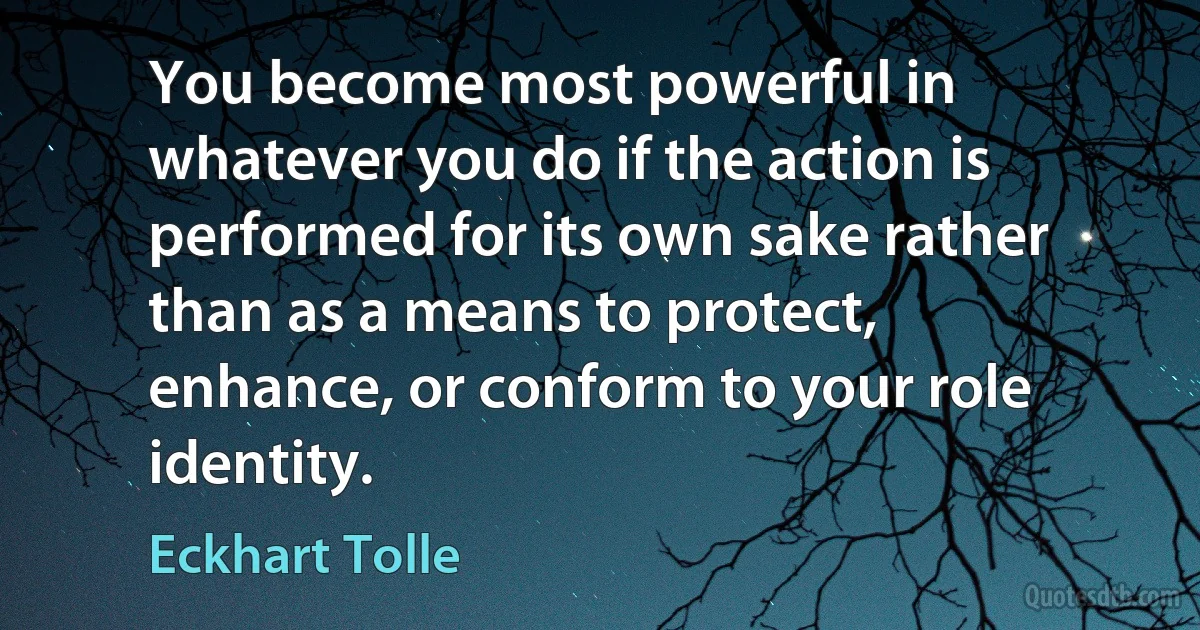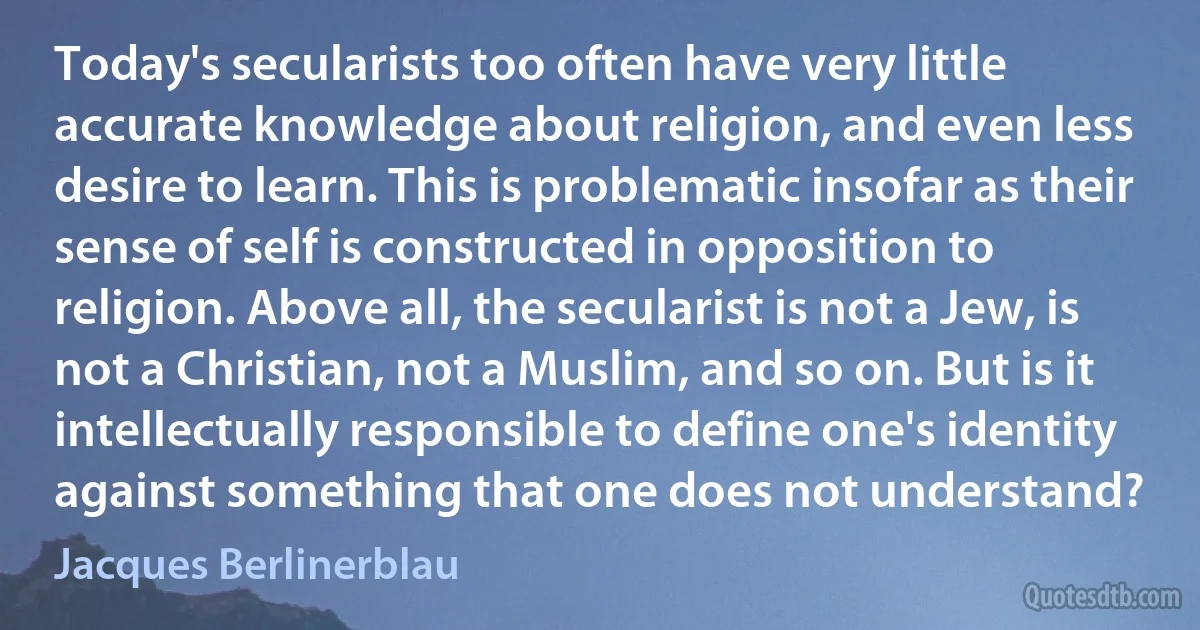Identity Quotes - page 18
In the Platonic dialectic, ... the terms "Being” "Non-being” "Movement,” "the One and the Many” "Identity” and "Contradiction” are methodically kept open, ambiguous, not fully defined. They have an open horizon, an entire universe of meaning which is gradually structured in the process of communication itself, but which is never closed. The propositions are submitted, developed, and tested in a dialogue, in which the partner is led to question the normally unquestioned universe of experience and speech, and to enter a new dimension of discourse - otherwise he is free and the discourse is addressed to his freedom. He is supposed to go beyond that which is given to him - as the speaker, in his proposition, goes beyond the initial setting of the terms. These terms have many meanings because the conditions to which they refer have many sides, implications, and effects which cannot be insulated and stabilized.

Herbert Marcuse
If the State, modeled after the universe, is split into two spheres or classes of beings – wherein the free represent the ideas and the unfree the concrete and sensate things – then the ultimate and uppermost order remains unrealized by both. By using sensate things as tools or organs, the ideas obtain a direct relationship to the apparitions and enter into them as souls. God, however, as identity of the highest order, remains above all reality and eternally has merely an indirect relationship. If then in the higher moral order the State represents a second nature, then the divine can never have anything other than an indirect relationship to it, never can it bear any real relationship to it, and religion, if it seeks to preserve itself in unscathed pure ideality, can therefore never exist – even in the most perfect State – other than esoterically in the form of mystery cults.

Friedrich Schelling
To let go of judgment does not mean that you don't see what they do. It means that you recognize their behavior as a form of conditioning, and you see it and accept it as that. You don't construct an identity out of it for that person.
That liberates you as well as the other person from identification with conditioning, with form, with mind. That liberates you as well as the other person from identification with conditioning, with form, with mind. The ego then no longer runs your relationships.

Eckhart Tolle
Every human being has been conditioned to think and behave in certain ways– conditioned genetically as well as by their childhood experiences and their cultural environment. That is not who they are, but that is who they appear to be. When you pronounce judgment upon someone, you confuse those conditioned mind patterns with who they are. To do that is in itself a deeply conditioned and unconscious pattern. You give them a conceptual identity, and that false identity becomes a prison not only for the other person but also for yourself. (Ch 8)

Eckhart Tolle
Content is nothing but the sum of organized tensions. From this point of view one can discover the basic identity of the rules of composition in all arts – always accepting that the arts can only represent their object materially by means of organised reactions.... already today one can safely assume that the roots of laws of composition are the same for art as they are for nature.

Wassily Kandinsky
A curious paradox: people have only the narrowest private interest in mind when they act, yet they are at the same time more than ever determined in their behavior by the instincts of the mass. ... The diversity of individual goals is immaterial in face of the identity of the determining forces.

Walter Benjamin
What can the earth do? There is only self-quantification of teleoplexy or cybernetic intensity, which is what computerized financial markets (in the end) are for. As accelerationism closes upon this circuit of teleoplexic self-evaluation, its theoretical 'position'-or situation relative to its object-becomes increasingly tangled, until it assumes the basic characteristics of a terminal identity crisis.

Nick Land
I think of Abstract Art in the same way I think of all Art, Past and Present. I see it as divided into two Major categories, Objective and Subjective. Objective Art is Absolute Art. Subjective Art is Illustration, or communication by Symbols, Replicas, and Oblique Emotional Passes. They are both Art, but their Content has no Identity. Their difference cannot be defined as a difference of Idiom, because all Paintings have the Laws of Design as a common denominator. Design exists as an Idiom of Color-Space Logic, and it also exists in an Idiom of Representational Likenesses. Objective Art and Subjective Art exist in both Idioms. Their difference can only be defined in terms of what the Artist thinks his Purpose means-its Content as a Design Image.

Stuart Davis
Given the present state of our knowledge, and insufficient thought on my part, my own prescription for the time being is to deal as best we can with individual differences and let the statistical group differences fall where they may. Society's general concern with race and other social group differences is not the product of research on these matters, but arises from chauvinist-like attitudes of racial group identity and solidarity in connection with political power and economic interest. It might be termed meta-racism. The ‘race problem' from that viewpoint is lower in my own hierarchy of values than concern with individual justice and alleviation of individual misfortune. Though it would be blind not to acknowledge the reality of certain statistical differences among populations, I would find it difficult to be the least concerned with any given individual's racial heritage. Perhaps I may be too insensitive on this score, never having felt much sense of racial identity myself.

Arthur Jensen
I will not change an error if it feels right, for the error is more human than perfection. I do not seek answers. I haven't named this work nor thought where it would go. I haven't thought what it is for, except that it is made to be seen. I've made it because it comes closer to saying who I am than any other method I can use. This work is my identity.

David Smith
There is no unity or organisation or even aesthetic unity [in Abstract Expressionism / w:New York School (art), but we do have a very strong bond in our defense, but we also are strongest in our own individual identity. Our effort, I think, is all shooting off in independent directions. And the artists themselves will not admit to the existence of the New York School. They won't admit to any classification, and most of those painters known as Abstract Expressionists are the first to say they are not.

David Smith


![[ Gustav Fechner ] was troubled by materialism... His philosophical solution of the spiritual problem lat in his affirmation of the identity of the mind and matter and in his assurance that the entire universe can be regarded as readily from the point of view of its consciousness... as it can be viewed as inert matter. (Edwin Boring)](https://cdn.quotesdtb.com/img/quotes_images_webp/38/edwin-boring-affirmation-assurance-422438.webp)
